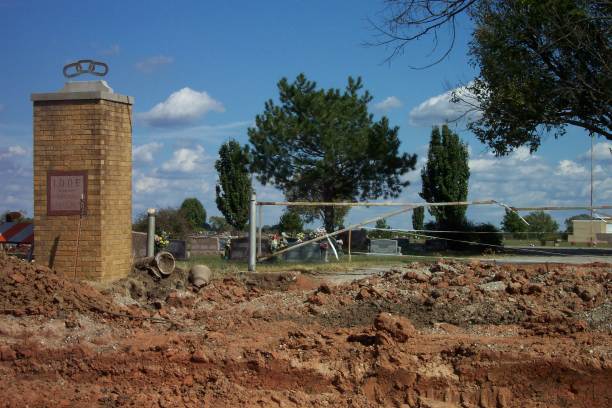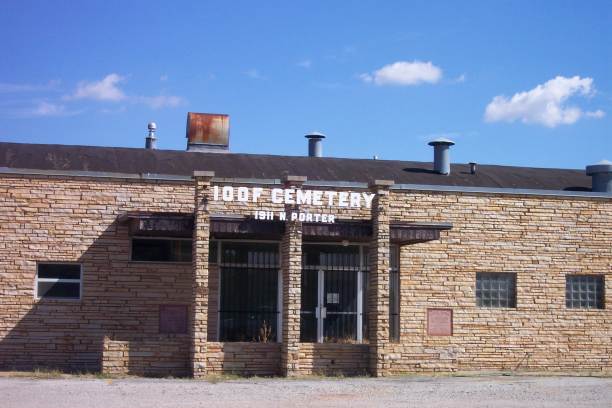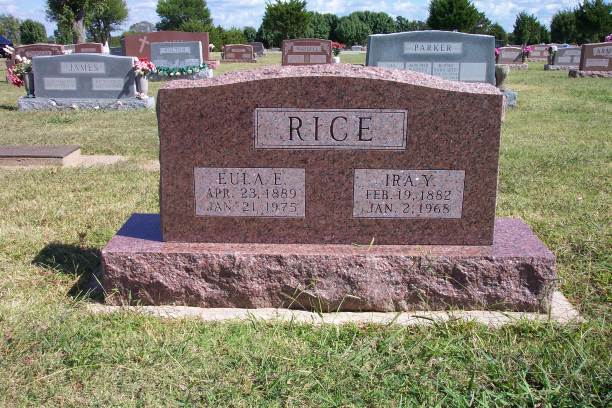Ira Young Rice Sr.
1882-1968
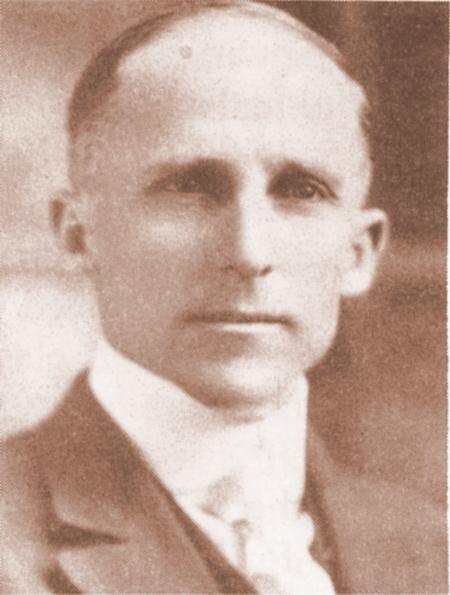
Biographical Sketch On The Life Of Ira Y. Rice Sr.
No series of articles on gospel preachers who have worked in this section (Oklahoma and Texas) of The Lord's kingdom, would be complete without mention of Ira Y. Rice, Sr. Brother Rice first came into Western Oklahoma from Arkansas in the early years of this century as a music teacher. He was born February 19, 1882 of Baptist parents near the little town of Banks in Bradley County, Arkansas. His son, Ira Y. Rice Jr., says: "He was always so full of teasing about things he felt unimportant that I could never be certain of some of the facts of his early years; however, he always told me that he finished the third grade and got as far as `baker' in the old Blue Back Speller." He did grow up in a time when educational opportunities were limited, but of course he did have much more education than he indicated to Ira Jr. in his teasing. Like many others of his time, he became well educated in The Book.
In early life he had considerable chest trouble, and his physician advised him to take up singing as a form of therapy. (This may have also been a consideration in his decision to move to the West.) He did study vocal music and had considerable natural ability, including a beautiful tenor voice and almost absolute pitch, and for the rest of his life he gave his all to the advancement of good singing. He became well educated in this field, having sat at the feet of such teachers as Ussery, Ferrill, Ezell, and others.

The Christian Worker
July 1975
Courtesy of Terry J. Gardner
Having been reared in a Baptist home, naturally he was headed that way religiously. However, his older brother, John M., who was also a music teacher and later a gospel preacher, preceded him to Western Oklahoma and had obeyed the gospel by the time Ira joined him there. John began the task of converting Ira, and this created a great deal of strife. Ira Jr. writes: "...I do remember his telling about his older brother, Uncle John, trying to convert him from the Baptists after John had obeyed the gospel in 1904. How he got so angry at Uncle John because of this, that even though John was almost twice the size of Ira, he almost knocked John right out of the buggy in which they were riding." Ira Jr. continues: "So reticent was he about many of the facts of his earlier days that I could never get it quite straight as to exactly who baptized him or when. I think, but am not sure, that it was Thomas S. Cobb who eventually baptized him." (Cobb was also a music teacher.)
I do not have the date of his move to Western Oklahoma, but he was married to Miss Alta McDonald, of Elk City, probably about the summer of 1908. She died in 1912, leaving no children. In 1916 he was married to Miss Eula Davis, of Hollis, Oklahoma. She was a graduate of Central State College, of Edmond, and was a school teacher. Her father was "Uncle Ned" Davis, an elder in the Hollis church. They made their home in Hollis from their marriage until they moved to Norman in 1921, where they made their home until the end. They moved to Norman so their children could attend the Oklahoma University. About 1935 when I was in some of my first preaching with the congregation in Sayre, Oklahoma, we had him come for a singing school, which was profitable and enjoyable. While there he did much visiting with old friends and acquaintances in Western Oklahoma.
He gave full time to singing schools and evangelistic singing until 1929. He often came back to Western Oklahoma for such work, and I remember attending several of his schools when I was a boy. After I began preaching I always took advantage of every opportunity to associate with him in the work, for I found him to be not only a very capable man, but also a most congenial fellow worker. Once, while living in Hollis, the "city dads" engaged him to teach the entire town to sing. He was very effective with all ages, but especially with children and young people. I do not know how many of his schools I attended but I do know he was very effective in getting the cooperation of his classes, and I do not recall ever knowing of any one who was able to "beg off" when he gave them an assignment, especially for public participation. Many tried it, but he had a way of getting people to do what he asked them to do. I still remember the deep dread that filled my heart when he announced one night that I would lead a song the next night. There was no way out for me, for my own father was as determined as Brother Rice that I should meet the assignment, but it was a real ordeal for me. He always had a good story or joke to get a laugh and set the people at ease. He called the little girls "dollies" and the boys were "judges," and my, how he could get them, as well as their parents, to sing.
The question of doctrinal loyalty to The Book had to be met by singers as well as the preachers. Singers, like the rest, had to learn, and some times this could take time. I remember once, when I was a child, that the churches in our little town banded together to have him come to the community for a singing school. It was held in the different church buildings, and the piano was used when they were in a building that had one. One night he announced that he appreciated the invitation to work with them, and would be happy to come again, but that he would be unable to again work with the piano. This shook things up quite a bit in the community. Of course THOSE people never needed him again, but The Church did have him return for further work. I know nothing of the background of this incident, but do remember that there was quite a bit of talk about it in our small town. Of course he knew that it would cost him money to make such an announcement, for never again would he be invited to work where the instrument was used. This wasn't easy, for he had a family to support; and singers, at least among us, have traditionally had a very hard time financially. Apparently, his major concern was in being right. His whole life demonstrated such devotion to the truth. It is reflected in his son, Ira Jr. in his firm stand for doctrinal loyalty.
In 1929 he began preaching. For about sixty years he served as a gospel singer, and also as a gospel preacher for thirty five of those years. His work was primarily in Oklahoma and Texas, but Ira Jr. finds "his tracks" all over the nation. He taught more than a hundred thousand people to sing, and baptized more than two thousand people. In addition to the financial sacrifices he had to make, his work kept him away from home for weeks at a time, extending at times to as much as three months. His companion and children felt this sacrifice keenly, along with him. Those who have not experienced such cannot conceive of the difficulty of it. After he obeyed the gospel he was a zealous soul winner, and one of his favorite songs was, "I Want To Be A Soul Winner For Jesus." He was especially effective in winning Baptist and Pentecostals to the New Testament faith.
Brother and Sister Rice had five children, all of whom are still living. (1975) They are: Ira Jr., Memphis, Tenn.; Floy R. Henry, Monterey, California; Col. Foy Rice, Carlisle, Pa.; Juanita Nichols, Los Angeles, Calif.; and Golda Clark, Taipei, Taiwan, Republic of China. The children were brought up in the nurture and admonition of The Lord, and it is my understanding that all of them are faithful Christians. Of course Ira Jr. is known world wide for his great evangelistic work in so many parts of the world.
"By reason of strength" he lived beyond the four score mark. The Lord terminated his earthly sojourn in January, 1968 at the age of eighty six. Seven years later, in January of 1975, his companion joined him in the better land. What was mortal sleeps in the Norman Oklahoma cemetery. Some day they will hear "...the shout of the Lord, the voice of the arch angel and the trump of God." They will arise from the dead and be rewarded for their lives of faith and devotion ... unto death.
-Gospel Preachers Of Yesteryear, Loyd L. Smith, Pages 286-289, First Appearing In The Christian Worker, Vol. 61, No. 7, July, 1975, page 1
![]()
He Sang And Preached The Word
No series of articles on gospel preachers who have worked in this section of the Lord's vineyard would be complete without mention of Ira Y. Rice, Sr. Brother Rice first came into Western Oklahoma in the early years of this century as a music teacher. He was born February 19, 1882 of Baptist parents near the little town of Banks in Bradley County Arkansas. His son, Ira Jr. says: "He always was so full of teasing about things he felt unimportant that I could never be certain of some of the facts regarding his early years; however, he always told me that he finished the third grade and got as far as "baker" in the old Blue Back speller." He did grow up in a time when educational opportunities were limited, but of course he did get much more education than he indicated to Ira Jr. in his teasing. Like many others of his time, he was well educated, especially in The Book.
In early life he had considerable chest trouble, and his physician advised him to take up singing as a form of therapy. (This may have also been a consideration in his decision to move toward the West.) He did study vocal music, had much natural ability including a beautiful tenor voice and almost absolute pitch, and for the rest of his life gave his all to the advancement of good singing. He was well educated in this field, having sat at the feet of such great teachers as Ussery, Ferrill, Ezell, and others.
Having been reared in a Baptist home, naturally, he was headed that way religiously. However, his older brother John M., who was also a music teacher and later a gospel preacher, preceded him to Western Oklahoma and had obeyed the gospel. John began the work of converting Ira, and this created quite a bit of strife. Ira Jr. writes: " . . . I do remember his telling about his older brother, uncle John, trying to convert him from the Baptist - - after John had obeyed the gospel in 1904. How he got so angry at uncle John because of this that even though uncle John was' almost twice his size, he almost knocked John right out of the buggy in which they were riding." Ira Jr. continues: "So reticent was he about many of the facts of his earlier days that I could never get it quite straight as to exactly who baptized him or when . . . I think, but am not sure, that it was Thomas S. Cobb who eventually baptized him." (Cobb was also a music teacher. LLS)
I do not have the date of his move to Western Oklahoma, but he was married to Miss Alta McDonald, of Elk City, probably about the summer of 1908. She died in 1912, leaving no children. In 1916 he was married to Miss Eula Edna Davis, of Hollis, Oklahoma. She was a graduate of Central State College of Edmond, and was a school teacher. Her father was "Uncle Ned" Davis, an elder in the Hollis church. They made their home in Hollis from their marriage until they moved to Norman in 1921, where they made their home until the end. They moved to Norman so their children would have access to the University. About 1935 when I was in some of my first preaching with the Sayre church, we had him come for a singing school, which was profitable and enjoyable. He had me take him to Elk City where we visited his first wife's parents.
He gave full time to singing schools and evangelistic singing until 1929. He often came back to Western Oklahoma for such work, and I remember attending several of his schools when I was a boy. After I began preaching I always took advantage of every opportunity to associate with him in the work, for I found him to be not only a very capable man, but also a most congenial fellow worker. Once, while living in Hollis, the "city dads" engaged him to teach the entire town to sing. He was very effective with all ages, but especially with children and young people. I do not know how many of his schools I attended, but I do know he was very effective in getting the cooperation of his class, and do not recall ever seeing anyone "beg off' when he called on them for public participation. Many tried it, but he had a way of getting them to do what he asked. I still remember the deep dread that filled my heart when he announced one night at Sentinel that I would lead a song the next night. There was no way out for me, for my own father was as determined as he that I should meet my assignments. I did it, but it was a real ordeal for me. He always had a good story or joke to get a laugh and set the people at ease. He called the little girls "dollies" and the boys "judges", and my how he could get them, as well as their parents, to sing.
The question of doctrinal loyalty to The Book had to be met by singers, as well as preachers. Singers, like the rest, had to learn and sometimes this could take time. I remember once, when I was a child, that the churches in Sentinel banded together to have him come for a community singing school. It was held in the different buildings, and the instrument was used when the class was in a building that had one. One night he announced that he appreciated the invitation to work with them, and would be happy to come again, but that he would be unable to again work with the piano. This shook things up quite a bit in the community. Of course THOSE people never needed him again, but the church there did have him return for further work. I know nothing of the background of this decision, but do remember that there was quite a bit of talk in the small town about it. He knew, of course, that it would "cost" him to make such an announcement, for never again would he be invited to work with those who use the instrument. This wasn't easy, for he had a family to support; and singers, at least among us, have traditionally had a very difficult time financially. Apparently, his major concern was being right. His whole life demonstrated such devotion to the truth. It is reflected in his son, Ira. Jr. and his firm stand for doctrinal loyalty.
In 1929 he began preaching. For about sixty years he served as a gospel singer, and also as a gospel preacher for thirty-five of those years. His work was primarily in Oklahoma and Texas, but Ira. Jr.. finds "his tracks" all over the nation. He taught more than a hundred thousand people to sing and baptized more than two thousand people. In addition to the financial sacrifices he had to make, his work kept him away from home for weeks at a time, extending at times as much as three months. His companions and children felt this sacrifice very keenly. Such sacrifices are unknown, really, by those who have not made them. After he obeyed the gospel he was a zealous soul winner for Jesus, and the song by that title was one of his favorites. He was especially effective in winning Baptist and Pentecostals, to the New Testament Faith.
Brother and Sister Rice had five children, all of whom are still living. They are: Ira Jr., Memphis, Tenn.;. Floy R. Henry, Monterey, California; Col. Foy Rice, Carlisle, Pa.; Juanita Nichols, Los Angeles, California; and Golda Clark, Taipei, Taiwan. Republic of China. The children were brought up in the "nurture and admonition of The Lord" and it is my understanding that all are faithful Christians. Of course Ira. Jr. is known world wide for the great work he has done in Asia, as well as at home.
"By reason of strength . . . "he lived beyond the four-score mark. The Lord terminated his earthly sojourn in January 1968 at the age of eighty-six. Seven years later, in January of this year (1975) his companion joined him in the better land. Their bodies sleep at Norman to await the " . . . shout" of The Lord, the "voice of the archangel" and "the trump of God," when they will be called forth to meet Him to be rewarded for their lives of faith and devotion " ... unto death .... "
-Lloyd L. Smith, Christian Worker, Vol. 61, #7, July, 1975, pages 1,2
Note: This is a timed piece. Some of the people mentioned as being alive are now deceased.
![]()
Directions The Grave Of Ira Y. Rice, Sr.
GPS Coordinates
Acc. to 25ft.
35°14'36.4"N 97°26'21.9"W
or D.d. 35.243450, -97.439417
Grave Faces West
The grave of Ira Y. and Eula Rice is located in the I.O.O.F. Cemetery, Norman, Oklahoma. The I.O.O.F. Cemetery is located south of Oklahoma City, Oklahoma in the town of Norman. Take Exit 114 on I-35. and head east on W. Indian Hills Rd. Go to North Porter Avenue and turn right (south). When crossing over W. Rock Creek Rd. the cemetery will be on the left. Go to the southern end of the cemetery, and the office is in the Norman Monument Company. Enter the cemetery and follow the directions on the map included below.
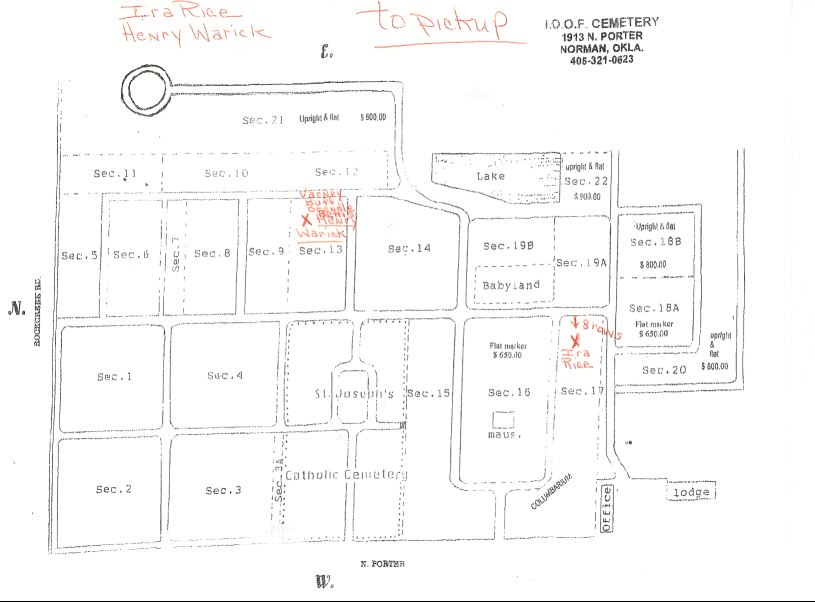
IOOF Cemetery Map - Location Of Graves Of Two Gospel Preachers: Ira Y. Rice Sr. & Henry E. Warlick
![]()
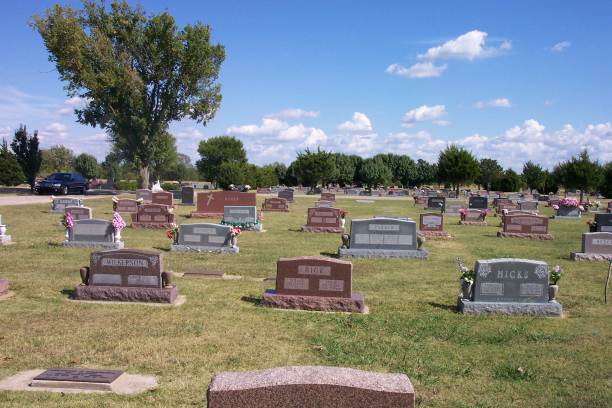
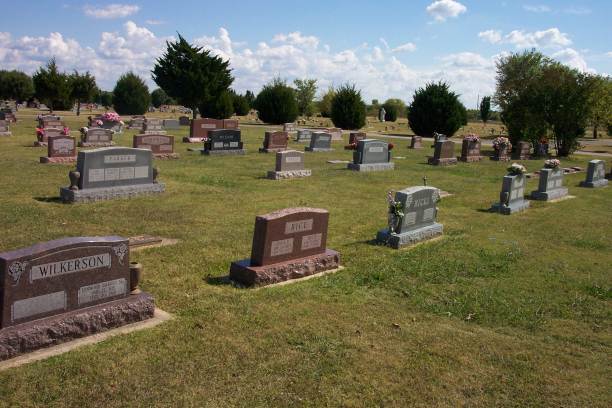
RICE
Eula E.
Apr. 23, 1889
Jan. 21, 1975
Ira Y.
Feb. 19, 1882
Jan. 2, 1968
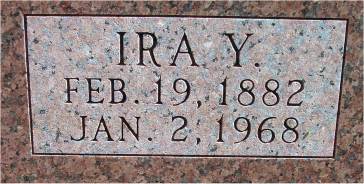
![]()
